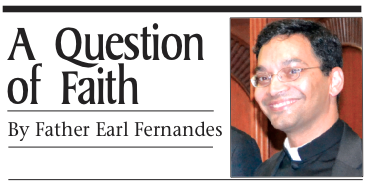What does the church teach about using technology?
 Dear Father: Am I crazy? I mean, my friends think I’m crazy because I won’t let my kids have a phone or an iPad. I want them to run around and play and not look at a screen all the time. People look at me as if I’m crazy. What does the church teach about technology use?
Dear Father: Am I crazy? I mean, my friends think I’m crazy because I won’t let my kids have a phone or an iPad. I want them to run around and play and not look at a screen all the time. People look at me as if I’m crazy. What does the church teach about technology use?
Dear Reader: Recently, I gave a talk for the National Catholic Educational Association on the Ethics of Emerging Technology. I didn’t use any technology in my talk to a group of technology-oriented people and urged caution and prudence in the use of technology- with things like mobile phones and I-Pads, but even with classroom technology. I am sure many thought I was crazy. That’s okay. You are not crazy. How you raise your children often involves a prudential judgment about what will serve the true good of your children. Other people may come to a different judgment.
The church does not view technology as evil. Technology can be a true good for humanity. Pope Benedict XVI in his last encyclical letter Caritas in veritate dedicated a whole chapter to the use of technology, which he characterized as a form of stewardship- a response to God’s command to till and keep the land (CIV, 69): “Technology enables us to exercise dominion over matter, to reduce risks, to save labor, to improve our conditions of life. It touches the heart of the vocation of human labor: in technology, seen as the product of his genius, man recognizes himself and forges his own humanity.”
However, just because we can do something doesn’t mean we ought to do something. Technology, while neutral and at times good, ought to be at the service of the person. Technologies, such as nuclear power, might be very useful, but one must also consider risks such as environmental hazards. Nuclear power can be used negatively too to create weapons for aggressive military action. In vitro fertilization may help some have a child, but it also leaves many embryos in a vulnerable and frozen state or denies a child his or her right to be born from a loving act between his or her parents. In general, technology must be scrutinized in the light of faith and the deeply held values of faith.
Technology ought to be at the service of the person. You need to ask whether technology is serving your children. People learn in different ways. Technology in the classroom might facilitate student learning and make children more efficient in the classroom, completing tasks more quickly. On the other hand, your reservations about technology might be rooted in the concern that children are too busy, too focused on being efficient. There are competing values: the value of listening to others and of simply being rather than always doing. There is also a value in play. Still, being outside, playing or contemplating creation has value in cultivating wonder. Values may not always be economic values, but there is value in being together with others and in contemplation.
Many parents, while appreciating children having technology for reasons of safety or education, are concerned that their children are only looking at screens and not engaging the people in front of them. While technology can connect people in new ways and make us aware of other peoples and cultures, sometimes people escape reality and concrete relationships through the use of technology. In this sense, one needs to scrutinize whether technology facilitates an authentic encounter between peoples. Consider Pope Francis’ words in “The Joy of the Gospel:” (EG, n. 88) “We are “constantly to run the risk of a face-to-face encounter with others, with their physical presence which challenges us, with their pain and their pleas, with their joy which infects us in our close and continuous interaction.” The pope speaks of an “art of accompaniment” — to make a commitment to people who need to be loved.
In the end, there is no hard and fast answer. You must make the best judgment before God, in light of the values that come to us from our faith, about what will truly help your children. You are not crazy. You are asking questions about what others simply accept. Asking questions is one way of discovering the truth and finding the right balance about what will be truly good for your children- what will help them best learn how to love God and neighbor.
Father Earl Fernandes is dean of Mount St. Mary’s Seminary and the Athenaeum of Ohio, where he is assistant professor of moral theology. To ask Father Earl a question about the Catholic faith, send an email to Steve Trosley or to The Catholic Telegraph, 100 E. Eighth St., Cincinnati, OH 45202.
This A Question of Faith column by Father Earl Fernandes originally appeared in the August 2014 print edition of The Catholic Telegraph.













